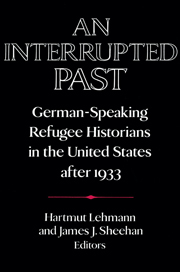Book contents
- Frontmatter
- Introduction
- PART I: Introduction
- 1 German and American Historiography in the Nineteenth and Twentieth Centuries
- 2 German Historiography during the Weimar Republic and the Émigré Historians
- 3 The Historical Seminar of the University of Berlin in the Twenties
- PART II: Introduction
- 4 Refugee Historians in America: Preemigration Germany to 1939
- 5 “Uphill Work”: The German Refugee Historians and American Institutions of Higher Learning
- 6 Everyday Life and Emigration: The Role of Women
- 7 The Special Case of Austrian Refugee Historians
- 8 Schicksalsgeschichte: Refugee Historians in the United States
- 9 German Historians in the Office of Strategic Services
- 10 The Refugee Scholar as Intellectual Educator: A Student's Recollections
- PART III: Introduction
- 11 German Émigré Historians in America: The Fifties, Sixties, and Seventies
- 12 The Americanization of Hajo Holborn
- 13 Explaining History: Hans Rosenberg
- 14 Ernst Kantorowicz and Theodor E. Mommsen
- 15 Refugee Historians and the German Historical Profession between 1950 and 1970
- Conclusion
- Index
6 - Everyday Life and Emigration: The Role of Women
Published online by Cambridge University Press: 05 January 2013
- Frontmatter
- Introduction
- PART I: Introduction
- 1 German and American Historiography in the Nineteenth and Twentieth Centuries
- 2 German Historiography during the Weimar Republic and the Émigré Historians
- 3 The Historical Seminar of the University of Berlin in the Twenties
- PART II: Introduction
- 4 Refugee Historians in America: Preemigration Germany to 1939
- 5 “Uphill Work”: The German Refugee Historians and American Institutions of Higher Learning
- 6 Everyday Life and Emigration: The Role of Women
- 7 The Special Case of Austrian Refugee Historians
- 8 Schicksalsgeschichte: Refugee Historians in the United States
- 9 German Historians in the Office of Strategic Services
- 10 The Refugee Scholar as Intellectual Educator: A Student's Recollections
- PART III: Introduction
- 11 German Émigré Historians in America: The Fifties, Sixties, and Seventies
- 12 The Americanization of Hajo Holborn
- 13 Explaining History: Hans Rosenberg
- 14 Ernst Kantorowicz and Theodor E. Mommsen
- 15 Refugee Historians and the German Historical Profession between 1950 and 1970
- Conclusion
- Index
Summary
Normally, women are mentioned all too infrequently in a volume such as this one. It appears that the refugee historians were nearly exclusively men. Nevertheless, questions arise which cannot be answered only by reflecting on “the historians” - the men - alone: How were refugee German academics able to survive the very first years of immigration? Who within the family provided the necessary income? Who made language instruction and occupational retraining possible? Who took care of the children, shopped for food, paid the rent, and so forth? While these questions appear to be of little relevance to theory, to the arts and sciences, they in fact constitute the very precondition for intellectual productivity. It is fitting that the émigré women be mentioned here, if only initially as the men's assistants - as the midwives, so to speak, of academic productivity in the field of history. To be truthful, a special volume devoted to the role of women in emigration would be necessary to really do the subject justice.
I am concerned here with the role of women in German-speaking, university-educated academic refugee families in the United States in general. I do not believe that the families of refugee historians differed significantly from the families of other academic refugees. However, it is striking that a relatively large number of émigré professors of history were able to obtain positions in the United States quite early on, in particular through the assistance of the Emergency Committee in Aid of Displaced Foreign Scholars.
- Type
- Chapter
- Information
- An Interrupted PastGerman-Speaking Refugee Historians in the United States after 1933, pp. 102 - 108Publisher: Cambridge University PressPrint publication year: 1991



